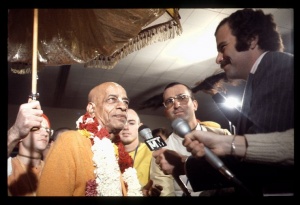SB 3.20.9: Difference between revisions
m (1 revision(s)) |
No edit summary |
||
| Line 1: | Line 1: | ||
{{info | {{info | ||
|speaker=Vidura | |speaker=Vidura | ||
|listener=Maitreya | |listener=Maitreya Ṛṣi | ||
}} | }} | ||
[[Category:Srimad-Bhagavatam - Canto 03 Chapter 20|S09]] | |||
[[Category:Bhagavatam Verses Spoken by Vidura - Vanisource|032009]] | |||
<div style="float:left">'''[[Srimad-Bhagavatam]] - [[SB 3|Third Canto]] - [[SB 3.20: Conversation Between Maitreya and Vidura|Chapter 20: Conversation Between Maitreya and Vidura]]'''</div> | |||
<div style="float:right">[[File:Go-previous.png|link=SB 3.20.8]] '''[[SB 3.20.8]] - [[SB 3.20.10]]''' [[File:Go-next.png|link=SB 3.20.10]]</div> | |||
{{RandomImage}} | |||
==== TEXT 9 ==== | ==== TEXT 9 ==== | ||
<div | <div class="verse"> | ||
vidura uvāca | :vidura uvāca | ||
prajāpati-patiḥ sṛṣṭvā | :prajāpati-patiḥ sṛṣṭvā | ||
prajā-sarge prajāpatīn | :prajā-sarge prajāpatīn | ||
kim ārabhata me brahman | :kim ārabhata me brahman | ||
prabrūhy avyakta-mārga-vit | :prabrūhy avyakta-mārga-vit | ||
</div> | </div> | ||
| Line 17: | Line 23: | ||
==== SYNONYMS ==== | ==== SYNONYMS ==== | ||
<div | <div class="synonyms"> | ||
viduraḥ | ''viduraḥ uvāca''—Vidura said; ''prajāpati-patiḥ''—Lord Brahmā; ''sṛṣṭvā''—after creating; ''prajā-sarge''—for the purpose of creating living beings; ''prajāpatīn''—the Prajāpatis; ''kim''—what; ''ārabhata''—started; ''me''—to me; ''brahman''—O holy sage; ''prabrūhi''—tell; ''avyakta-mārga-vit''—knower of that which we do not know. | ||
</div> | </div> | ||
| Line 24: | Line 30: | ||
==== TRANSLATION ==== | ==== TRANSLATION ==== | ||
<div | <div class="translation"> | ||
Vidura said: Since you know of matters inconceivable to us, tell me, O holy sage, what did Brahmā do to create living beings after evolving the Prajāpatis, the progenitors of living beings? | Vidura said: Since you know of matters inconceivable to us, tell me, O holy sage, what did Brahmā do to create living beings after evolving the Prajāpatis, the progenitors of living beings? | ||
</div> | </div> | ||
| Line 31: | Line 37: | ||
==== PURPORT ==== | ==== PURPORT ==== | ||
<div | <div class="purport"> | ||
Significant here is the word avyakta-mārga-vit, "one who knows that which is beyond our perception." To know matters beyond one's perception, one has to learn from a superior authority in the line of disciplic succession. Just to know who is our father is beyond our perception. For that, the mother is the authority. Similarly, we have to understand everything beyond our perception from the authority who actually knows. The first avyakta-mārga-vit, or authority, is Brahmā, and the next authority in disciplic succession is Nārada. Maitreya Ṛṣi belongs to that disciplic succession, so he also is avyakta-mārga-vit. Anyone in the bona fide line of disciplic succession is avyakta-mārga-vit, a personality who knows that which is beyond ordinary perception. | Significant here is the word ''avyakta-mārga-vit'', "one who knows that which is beyond our perception." To know matters beyond one's perception, one has to learn from a superior authority in the line of disciplic succession. Just to know who is our father is beyond our perception. For that, the mother is the authority. Similarly, we have to understand everything beyond our perception from the authority who actually knows. The first ''avyakta-mārga-vit'', or authority, is Brahmā, and the next authority in disciplic succession is Nārada. Maitreya Ṛṣi belongs to that disciplic succession, so he also is ''avyakta-mārga-vit''. Anyone in the bona fide line of disciplic succession is ''avyakta-mārga-vit'', a personality who knows that which is beyond ordinary perception. | ||
</div> | </div> | ||
__NOTOC__ | |||
<div style="float:right; clear:both;">[[File:Go-previous.png|link=SB 3.20.8]] '''[[SB 3.20.8]] - [[SB 3.20.10]]''' [[File:Go-next.png|link=SB 3.20.10]]</div> | |||
__NOTOC__ | |||
__NOEDITSECTION__ | |||
Revision as of 10:35, 6 May 2021

A.C. Bhaktivedanta Swami Prabhupada
TEXT 9
- vidura uvāca
- prajāpati-patiḥ sṛṣṭvā
- prajā-sarge prajāpatīn
- kim ārabhata me brahman
- prabrūhy avyakta-mārga-vit
SYNONYMS
viduraḥ uvāca—Vidura said; prajāpati-patiḥ—Lord Brahmā; sṛṣṭvā—after creating; prajā-sarge—for the purpose of creating living beings; prajāpatīn—the Prajāpatis; kim—what; ārabhata—started; me—to me; brahman—O holy sage; prabrūhi—tell; avyakta-mārga-vit—knower of that which we do not know.
TRANSLATION
Vidura said: Since you know of matters inconceivable to us, tell me, O holy sage, what did Brahmā do to create living beings after evolving the Prajāpatis, the progenitors of living beings?
PURPORT
Significant here is the word avyakta-mārga-vit, "one who knows that which is beyond our perception." To know matters beyond one's perception, one has to learn from a superior authority in the line of disciplic succession. Just to know who is our father is beyond our perception. For that, the mother is the authority. Similarly, we have to understand everything beyond our perception from the authority who actually knows. The first avyakta-mārga-vit, or authority, is Brahmā, and the next authority in disciplic succession is Nārada. Maitreya Ṛṣi belongs to that disciplic succession, so he also is avyakta-mārga-vit. Anyone in the bona fide line of disciplic succession is avyakta-mārga-vit, a personality who knows that which is beyond ordinary perception.